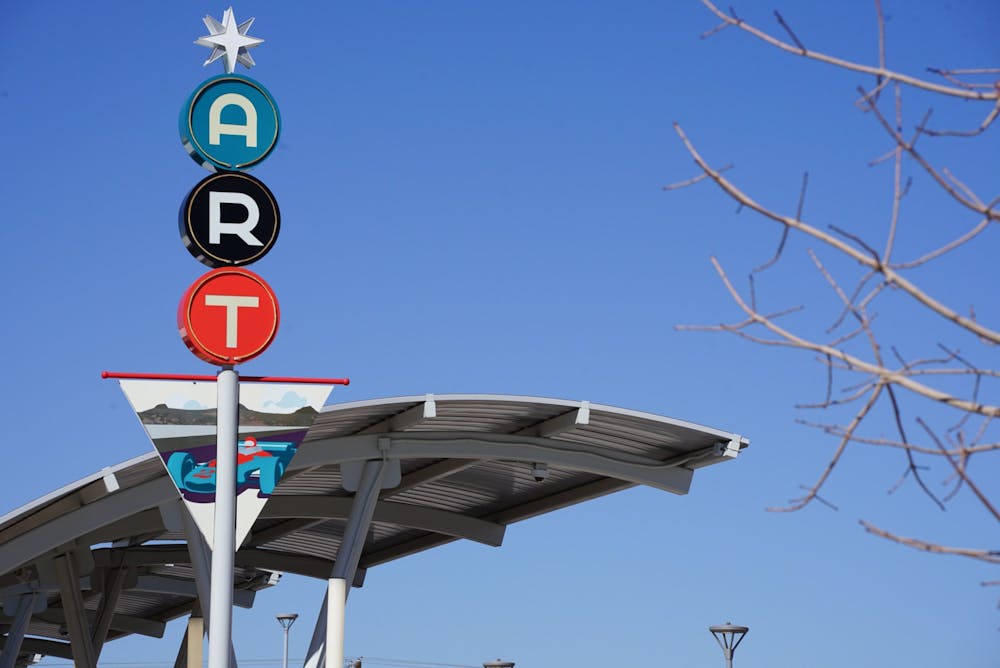Albuquerque Ride introduced its first electric bus on Jan. 30. This was a part of Mayor Tim Keller’s pre-pandemic plan to move Albuquerque to 100 percent renewable energy by 2030.
Rick De Reyes, a public information officer at ABQ Ride said, “This is part of Mayor Keller and the city’s overall plan to make Albuquerque a 100 percent renewable energy city by 2030. The city had already planned before the pandemic to lease one electric bus before the purchase, in order to test it out on Albuquerque’s roadways.”
Nathen Begay is an advanced public lands transportation fellow at the Valle de Oro national wildlife refuge. Begay has advocated for improvements in public transit in Albuquerque in the past and looks forward to an eco-friendly transit system.
“I think I'm very excited to see where that goes in the future and seeing the city move more towards electric buses. I think that's the way that the transit agencies across the country are going,” Begay said.
Rachel Swanson-Franz, from the wilderness society, spoke on how much pollution there is in transit, and how this is a good first step.
“You know with climate emissions, the transit sector is a very large emitter of CO2. So all of those little things add up and help. So it's huge,” Swanson-Franz said.
Swanson-Franz also noted how, even amidst a pandemic, where fewer people may be taking public transit, it is still of the utmost importance to continue to fund it because many still rely on it.
“There is this core group of the population that needs to use it. And it's really important that we know we are willing to invest in it, even if we're not actively riding it all the time,” Swanson-Franz said.
Calls for further change in Albuquerque transit are also being heard, with groups like Together for Brothers advocating for transit equity.
Christopher Ramirez, who is the executive director and co-founder of Together for Brothers, spoke about a health impact assessment they did back in 2017, that connected health with access to transportation.
“We did a health impact assessment. And in the HIA, young people in particular armultie most impacted with that the connection between transportation and health,” Ramirez said. “And that's where we came up with those social determinants of health, access to education, employment, recreation and healthy habits, including food security.”
De Reyes said he believes Albuquerque already has one of the most equitable transit systems in the nation.
Get content from The Daily Lobo delivered to your inbox
“We haven’t raised our basic fare of $1 since 2002… while many cities of comparable size have raised their fares several times since then,” De Reyes said.
Ramierez and Together for Brothers are advocating for free transit fares as a way to help give people access to transit, stating that the dollar fares are still too much.
“And then that might not seem like a lot to most people. But that can… be a deal-breaker” Ramirez said.
Other cities across the nation have already implemented free transit including Baltimore, Cleveland and Kansas City.
Currently, the city has plans to continue its transition to electrical busses and will release five in total by the end of the year.
“Before the pandemic was even a reality, ABQ Ride had already made plans to buy five electric buses, with the money coming from FTA grants, not the city taxpayers’ checkbooks,” De Reyes said.
Ramirez is also serving on the city's transit advisory board and encourages people to show up to their monthly meetings on Zoom to give input on what the community wants to see.
“There are opportunities with the transit advisory board, and to speak directly to ABQ ride… We're trying to increase access for the community to be able to give their input and feedback. There should be easy ways for that to happen,” Ramirez said.
After some initial turbulence, with the bus needing to go into the shop for transmission issues, it was up and running by the afternoon of Feb. 26.
Madeline Pukite is a beat reporter at the Daily Lobo. She can be contacted at news@dailylobo.com or on Twitter @madelinepukite






